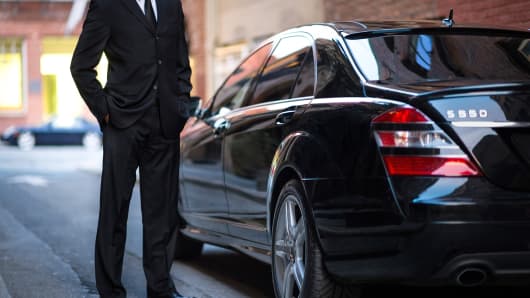Imagine that this is how you earn your living: On those days you choose to work, you pick your starting time. You get in your car to wait for a message on your smartphone from a remote center that a stranger needs a ride somewhere. During those hours you choose to be available, you accept or ignore as many or as few rides as you like. Once each ride is completed, the remote center deposits into your bank account your specified share of the fare set by the remote center. Any taxes are your responsibility, as is gas and the upkeep of your car, which you remain free to use for personal purposes. You decide when to end each work day.
To become eligible to receive these messages from the remote center, you have to pass a background check, your car can't be an antique, and you have to carry a million bucks in insurance. To continue receiving alerts from the center, your passengers have to show a consistently high level of satisfaction with your service.
Sounds like a pretty independent gig, right? But is it enough to make you an independent contractor, without the legal protections that come with being an employee? That largely depends, says the California Labor Commissioner, on how to classify the business of the remote center that sends you the messages of passengers wanting rides.
Recently, a hearing officer applied California's legal test for distinguishing between an employee and an independent contractor, concluding that a complaining Uber driver in San Francisco, Barbara Berwick, was an employee. California presumes that workers are employees unless the hiring party can show the workers are independent contractors. The hearing officer concluded that drivers were integral to Uber's business, notwithstanding the company's contention that all it did was generate a lead for the driver and facilitate a ride for the passenger. Uber, said the hearing officer, is "in business to provide transportation services to passengers." No drivers, no Uber.
Read MoreCalifornia rules Uber driver is an employee
Additionally, the hearing officer said that, by obtaining the clients who needed the driver's services, Uber "retained all necessary control over the operation as a whole," making the driver Uber's employee under California law. The consequence in this case was that Uber was ordered to reimburse the driver about $4,000 for the cost of mileage and tolls she incurred during the 49 days she did work as an Uber driver. Uber has appealed.
So is Uber in the business of transportation or is it in the business of lead generation? Uber's business model depends on the answer being the latter. The answer matters in an existential way because being an employer, particularly a California employer, takes too big a bite out of overhead.
But Uber does not face this existential threat alone. Is TaskRabbit in the business of chore completion or in the business of lead generation? Is Postmate in the business of package delivery or in the business of lead generation? Is Airbnb in the business of lodging or in the business of lead generation?
Read MoreLured by income and flexibility, retirees becoming Uber drivers
Ms. Berwick may win her case, but, as Uber has emphasized, it is just one case involving just one driver in just one (gigantic) state. Barring review by higher courts, the case won't set precedent. That doesn't mean it won't inspire a lot of people, particularly in California, to file copycat claims seeking benefits of employment, such as overtime or workers' compensation payments, without the conventional demands of time and place generally associated with employment.
A legislative answer, preferably a national legislative answer, is warranted to provide a durable solution to what is, at heart, a question of public policy. The judiciary addresses issues on a case-by-case basis by applying particular facts to sometimes ambiguous rules of law. That's not enough here.
There are two ironies about this moment in the development of the law of this new model of work. The first is that a ruling that threatens the life of the sharing economy came in the backyard of Silicon Valley, the sharing economy's designated birthplace. The other irony is that eliminating the threat of workplace regulation posed by the ruling may require more workplace regulation in the form of a new legislative model of work-for-hire.
Read MoreUber banned in East Hampton just before summer
The problem at hand is not fully formed; the solution will take time. The same level of creativity and persistence that gave rise to these ventures will be required to create a legal framework that will allow them to continue to thrive.
Commentary by Dan Eaton, a partner with the San Diego law firm of Seltzer Caplan McMahon Vitek where his practice focuses on defending and advising employers. He also is a professor at the San Diego State University College of Business Administration where he teaches classes in business ethics and employment law. Follow him on Twitter @DanEatonlaw.


